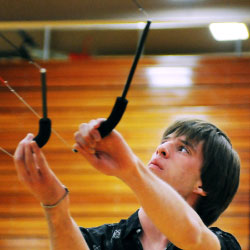
My bracelet allows me to live a normal lifestyle because I know that if there’s an emergency, my medical information is available and I will receive the help I need.
Connor, MedicAlert Member since 1997
Click Here to Renew. Need help? Call us at 1-800-432-5378 Monday – Friday 6:00 a.m. – 4:30 p.m. PT
Epilepsy in childhood is a fairly common neurological condition. It affects around 470,000 children in the United States, according to the Centers for Disease Control and Prevention (CDC). Common symptoms include confusion, staring spells, uncontrollable jerking or spasms, and loss of consciousness.
Living with childhood epilepsy doesn’t have to mean limiting your abilities or lifestyle, though. As you’ll learn with our story about MedicAlert member Connor Doran, growing up with epilepsy requires some changes, but doesn’t have to slow you down.

Connor Doran was on the 2010 season of America’s Got Talent and was the first to compete with his talent, indoor kite flying. His unique ability to effortlessly fly a four-line kite in a windless environment intrigued both the judges and audience members. This placed him as one of the top 12 semifinalists on the show.
Connor’s interest with indoor kites began over five years ago when he attended a kite festival in Bend, Oregon. His natural ability with the sport was evident immediately. Connor started competing with a single-line kite only a week after attending the festival. He even received the award for first place. Since then, he has won several competitions with indoor kite flying and has been a guest performer at events throughout the nation.
Connor has been a MedicAlert® member for more than 15 years. At age four, he started to experience seizures that would occur several times each day. Diagnosed with epilepsy, his doctor recommended that Connor start to wear a MedicAlert bracelet.
My bracelet allows me to live a normal lifestyle because I know that if there’s an emergency, my medical information is available and I will receive the help I need.
Connor, MedicAlert Member since 1997
His mother, Amy Doran, said that his MedicAlert protection plan gives her peace of mind knowing that when they aren’t together, his bracelet will notify others of his seizures.
For Connor, his MedicAlert epilepsy bracelet and membership provide him with independence and a sense of security. “My bracelet and protection plan allows me to live a normal lifestyle because I know that if there’s an emergency, my medical information is available and I will receive the help I need.”
Since the show aired, Connor has been competing all over the United States in various kite competitions. He’s also an honor student at the South Puget Sound Community College. In addition, Connor is an advocate for the Epilepsy Foundation and he created the “Dare to Dream Team” that is geared towards raising awareness about epilepsy and anti-bullying.
According to MedicAlert partner the Epilepsy Foundation, epilepsy doesn’t have a known cause in about half of the people who are diagnosed. Known causes include genetic (hereditary) factors, brain infections, brain structure problems, metabolic disorders, and autoimmune epilepsy (where the body mistakenly attacks itself).
Children who are diagnosed with epilepsy should be seen by a doctor that specializes in treating the condition. This is usually a pediatric neurologist. To determine the diagnosis, a doctor combines examination and medical history with tests like an electroencephalogram (EEG) and images of the brain. This helps them pinpoint abnormal brain electrical activity and other problems.
Medication is often recommended as the first line of defense in treating epilepsy. There are many different types of medications for epilepsy. A child’s neurologist will work to find the best one to control and manage symptoms.
Other treatment options can include surgery, special diets, complementary therapies, and vagus nerve stimulation (VNS).
Learn more about this condition on the medical conditions page.
Read More >
Read about other conditions that our MedicAlert members live with.
Read More >
Children diagnosed with epilepsy can and do live active lives. There are certain precautions they may need to take to make sure they stay safe. For example, they may enjoy swimming but should always swim with another person in case of a seizure.
Your child’s doctor may recommend that activities like climbing and some sports be avoided, so it’s always important to discuss your child’s specific situation with their healthcare team.
MedicAlert IDs for epilepsy also offer an added layer of protection in case of emergency. If a child is wearing a medical ID, even if they can’t communicate during or after a seizure, all of their important medical information is clearly shared with first responders and other medical personnel.
It’s this kind of support that has helped MedicAlert member Connor to live life to the fullest. He’s even discovered that he has a unique skill, despite growing up with an epilepsy diagnosis.